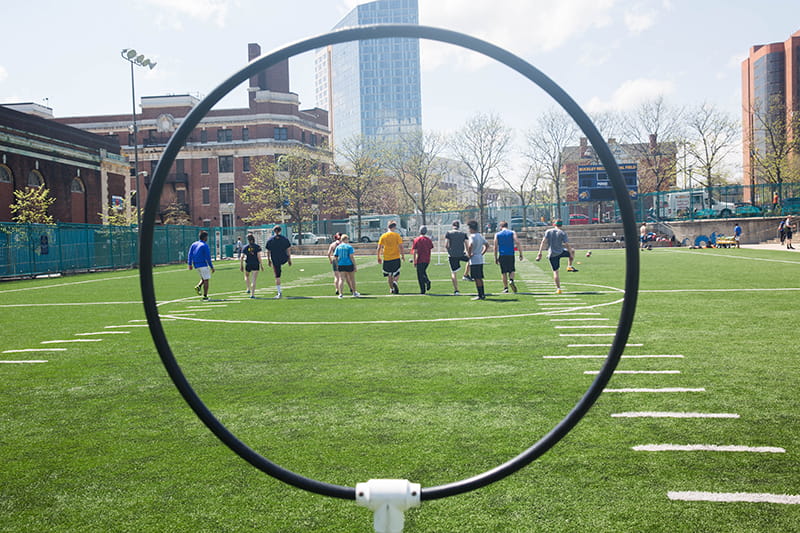Drexel Quidditch Club Brings Storybook Sport to Life for Dedicated Students

Members of the Drexel Quidditch Club practice on Buckley Field. Photo by Jordan Stein.
It’s a perfect, 75-degree Saturday on Drexel University’s University City campus, and 13 students are assembled on Buckley Field for practice.
Some may think it’s perfect spring weather for a baseball game, pick-up basketball or a round of golf — but these students are here to play Quidditch.
Quidditch is the fictional sport that Harry Potter and his classmates play in the popular book series that was then brought into the real world. In fact, there are more than 500 Quidditch teams in 26 countries, with Drexel’s team having been founded in 2010.
Quidditch is the fictional sport that Harry Potter and his classmates play in the popular book series that was then brought into the real world. In fact, there are more than 500 Quidditch teams in 26 countries, with Drexel’s team having been founded in 2010.
“We assign people based on previous sports experience and what we think they’d probably be good at, “ said senior game art & production student Mark Takakjy while explaining how the team assigns players to the sport’s three main positions: beaters, seekers and chaser/keepers (who both score and defend goals throughout the game). “For chasers and keepers, it’s a lot of quick foot movements as well as a lot of passing [the quaffle]. So if you have previous experience in sports like soccer or basketball, you tend to excel more in those. Beaters are the ones who throw bludgers, which are pretty much dodgeballs, so preferred experience would be sports that stress throwing mechanics like baseball and softball. Rugby is also a plus because there’s a lot of tackling involved. And then seekers, the best ones tend to have wrestling experience, actually, because the snitch is actually a tennis ball in a sock Velcro-ed to a guy’s shorts. Seeking is essentially a giant wrestling match.”
Today’s practice is split between the chaser/keepers and the beaters running their respective drills. The sun continues to beat down, turning the conditions to less-than-ideal given the intensity with which this team practices.
Today’s practice is split between the chaser/keepers and the beaters running their respective drills. The sun continues to beat down, turning the conditions to less-than-ideal given the intensity with which this team practices.
A passerby astonishingly yells, “Oh my god, they’re playing Quidditch!” as the team continues on with practice, unphased.
Some of the senior members of the team, including Shaffer and Shah, didn’t even grow up reading the Harry Potter series. Some others were drawn to the sport for that reason fully.
“I got into the Harry Potter series a couple of weeks before I started junior year and that was around the time of college applications,” said Eden Skye Einhorn, a freshmen fashion design student who plays beater and seeker on the team. “I forget how, but I found out Drexel had a Quidditch team and that was one of the two reasons that helped push me to go to Drexel along with the Pennoni Honors College’s honors program.”
Sangaline found Quidditch after 10 years of playing soccer before college. She wanted to stay active, but also try something new. Despite this, she says there are also people on the team for whom it’s their first time playing an organized sport.
“If you’re not athletic, that’s OK. We will work with you,” she said. “If you’re very athletic, we’ll also work with you. There’s a place for everyone on this team regardless of athletic experience or physical ability.”
Sangaline said practices are always open to anyone who might be curious about Quidditch and want to try it out. However, this doesn’t mean the team is for the faint of heart. They try to make practice mandatory, and were actually just promoted this year from being a student organization to gaining status as a club sport.
“We’ve been fighting to be a club sport since our founding,” Sangaline said. “Since day one, we’ve been like, ‘Listen, we’re a full-contact, co-ed sport. We need to make sure that we have access to the space, the equipment, the trainers that we need in case something is to happen.’”
“We’ve been fighting to be a club sport since our founding,” Sangaline said. “Since day one, we’ve been like, ‘Listen, we’re a full-contact, co-ed sport. We need to make sure that we have access to the space, the equipment, the trainers that we need in case something is to happen.’”
This aspiration is what brings the team out every Saturday for a two-hour practice that ends with scrimmages and suicide sprints. That, and the fact that the team feels like a family.
“We hang out a lot outside of the pitch as well,” Sangaline said. “We’ll have random get-togethers at my house. We’ll go out for food a lot, we’ll do homework together. We’re pretty close-knit, but we’re also very open and welcoming.”
“[Quidditch] was built off the idea of taking in anybody who wanted to be different, who didn’t want to follow the mainstream sports,” Takakjy added. “The people that weren’t afraid of just doing something fun and unique… it’s for a bunch of people to get together and say, ‘We don’t care what you think of us, we’re just having fun.’ Not everybody understands the kind of thing that we have, and whenever people are willing to take part in it, we love it.”
Drexel News is produced by
University Marketing and Communications.

